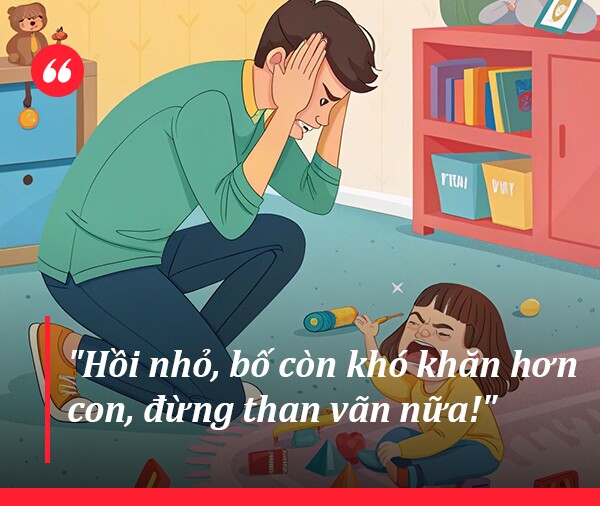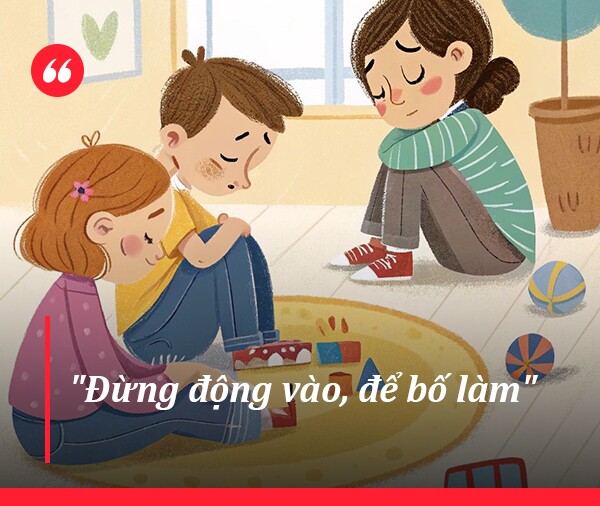While many fathers love their children, some may unintentionally employ harmful parenting methods that hinder their child’s development. The following are four statements commonly made by such fathers, which can limit their child’s potential:


Excessive Comparison: “When I was your age, I had it much tougher. Stop complaining!”
This scenario is familiar to many. Fathers tend to dismiss their children’s current struggles by comparing them to their own past hardships. However, such comparisons can be emotionally damaging and create a barrier in the parent-child relationship.
When parents use their own experiences to minimize their child’s feelings, the child feels that their emotions are not being taken seriously. As a result, they may internalize their thoughts and emotions, leading to a reluctance to share and express themselves openly.

Children need to understand that their emotions are valid and important, regardless of whether their parents have experienced similar situations. Instead of dismissing their struggles, parents should acknowledge and validate their children’s feelings. A simple question like, “How do you feel about this?” can open up a deeper conversation and make the child feel understood and accepted.

Avoiding Responsibility: “I’m busy, ask your mother.”
The absence of a father figure in a child’s life can have significant impacts on their development. Research published in the Journal of Personality and Social Psychology suggests that children from families with less involved fathers are more likely to face social, emotional, and behavioral challenges.
Specifically, boys may struggle with developing a healthy sense of gender identity and behavioral patterns due to the lack of effective guidance from their fathers.

A 2023 survey by the China Youth Research Center also revealed that in 80% of families with teenagers experiencing psychological issues, the main cause was attributed to the lack of paternal involvement in their upbringing.
When a father is absent, children are exposed to a single method of education and value system, which can be detrimental to their healthy development.

Material Compensation for Emotional Neglect: “We have money; I’ll make it up to you.”
Mr. Zhang from Sichuan, China, is a successful businessman, but his relationship with his 17-year-old daughter is strained. Whenever she tries to confide in him, he brushes her off with excuses about his busy work schedule. He then attempts to make amends by giving her expensive gifts on her birthday or when she achieves good grades.
“I’ve provided her with the best living conditions and the most expensive education. Isn’t that enough?” Mr. Zhang asks the psychologist in confusion. “Why does she keep saying I don’t understand her?”

Substituting material wealth for emotional connection is a common issue among modern fathers. Many believe that providing financial stability fulfills their paternal duties, failing to realize that their children crave a meaningful relationship and emotional support.
Research has shown that children who primarily receive material satisfaction instead of emotional support are more likely to develop selfish tendencies and a lack of empathy, which can hinder their social development and career choices later in life.

Unintentionally Hindering Self-Reliance: “Don’t touch that; let me do it.”
On a weekend, Mr. Chen and his 8-year-old son, Xiao Hao, were playing in the garden. Xiao Hao was learning to tie his shoelaces, a bit clumsily but with great effort. However, after observing for a while, Mr. Chen lost patience, snatched the shoe, and said, “You’re too slow! Let me do it properly.”
A common mistake made by fathers is doing everything for their children, inadvertently taking away their opportunities to learn from their mistakes and develop self-reliance.

According to educational psychologist Carol Dweck’s growth mindset theory, the sense of accomplishment children gain from overcoming challenges is crucial for building self-confidence and perseverance. When parents do everything for their children, they are inadvertently hindering their child’s opportunity to develop independence.
Moreover, this over-involvement often comes with impatience and perfectionism, leading to children feeling confused and believing that they are incapable. Over time, they may lose their courage to try new things and become dependent and passive.
































